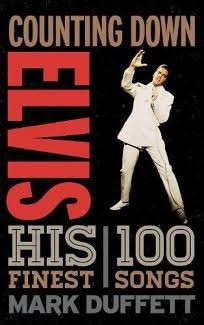
Here at the Flyer, we’re all about the art of songwriting, as evidenced in our June 27th cover story, but we also appreciate what both the Rolling Stones and Alex Chilton told us: “It’s the singer not the song.” And surely no artist embodies that truism more than Elvis Presley, who wrote precious little during his career, but excelled at making others’ handiwork his own.
Author Mark Duffett, Reader in Media and Cultural Studies at the University of Chester in England, is no stranger to Elvis, and no stranger to Memphis. In 2017, he and Amanda Nell Edgar, Assistant Professor at the University of Memphis’ Department of Communication and Film, organized the international conference New Perspectives on Elvis. They and the speakers they assembled were true fans of the King and Memphis generally, who’s enthusiasm led them to delve deeper than your typical music journalist.
This was evident again this March, when the pair hosted a more wide-ranging conference, Balancing the Mix, wherein scholars and deep listeners dove into such topics as “Hip Hop Resistance Across Time and Space,” “Justice from Blues to Soul,” “Music and Erasure,” and “Beyond the Music: The Sounds of the Street and Social Justice in Britain and France, 1970-1990.”
The latter had an exploration of the U.K.’s Northern Soul movement, and associated indie zines, that would have made any Memphis vinyl nerd swoon. And presentations like “Pocahontas, Ira Hayes and Me: Popular Music and the fight for Native American Civil Rights,” by Johnny Hopkins of Southampton Solent University, shed unaccustomed light on long-neglected pockets of musical resistance.
If that all sounds a bit ivory-towerish, I would only direct you to Duffett’s study of the King, Counting Down Elvis: His 100 Finest Songs (Rowman & Littlefield, 2018), which is one of the most entertaining meditations on Elvis’ work of the decade.
While many Elvis writers focus on one or the other phase of his career, this book is notable for its all-embracing appreciation of every stylistic shift the King made. Done in true countdown style, you will see many surprises along the way, including Duffett’s choice of number one. But, as Duffett himself notes, the point is not so much the specific order but the dialogue that the list is meant to jump start. And along the way, we read some keen observations of the nuts and bolts of each number.
For starters, Duffett is remarkably thorough about the songwriters that supplied Elvis’ material, especially in a book devoted primarily to an interpreter rather than composer of music. “They tried a new number by Giant, Baum, and Kaye,” Duffett writes. “‘Power of My Love’ ranks in any Elvis compilation for the simple reason that it showcases him at his most masculine, adult, and sensual…it effortlessly bridges between the raw urgency of the Comeback Special and virile confidence of his early 1970s shows.”
Duffett is well-versed in every phase and detail of Presley’s career, allowing him to make free-ranging comparisons between songs. And, unlike many critics, he embraces the kitsch of Elvis in the 70s as something just as vital as “Good Rockin’ Tonight.”
Thus, we are treated to a deep reading of Elvis’ version of “Let Me Be There,” better known as a hit by Olivia Newton-John. “Compared to Newton-John’s breezy rendering, Elvis’ cover is a tour de force. The joy of community reigns supreme.” And he notes that the song “was so cherished that he kept it in his live set on a fairly regular basis until early 1976. The 20 March 1974 Mid-South Coliseum recording was even dusted off to round out the first side of what became his last will and testament, the LP Moody Blue.”
Clearly, this book takes into account many deep cuts that dabblers would miss. Indeed, it could be an invaluable companion to the excellent Elvis Radio on Sirius XM, hosted by the erudite Doc Walker. Duffett’s writing, too, is impressively unaffected by the jargon and abstractions of the academy, making this a fun and entertaining read. Often, one is either an Elvis fan or one is not. But delving into the details with Duffett might make you sit up and listen to songs, and see sides of the King, you never knew were there.